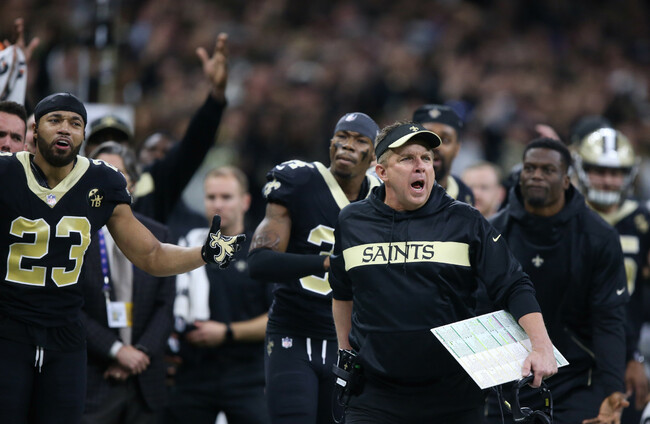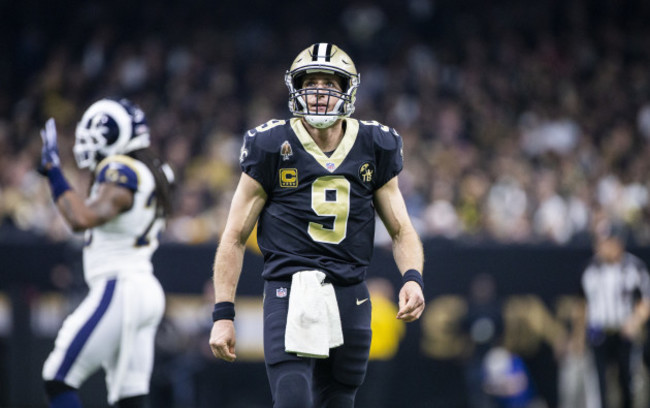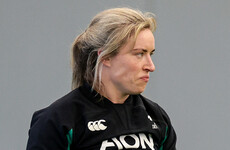LET’S GET THE obvious out of the way first; recency bias exists.
It is especially prevalent in sports where we are keen to declare things that have just happened as the best or worst we’ve ever seen.
But it’s also true that sometimes we do witness greatness or, in the case of Nickell Robey-Coleman’s hit on New Orleans Saints wide receiver Tommylee Lewis last night, the worst no-call in playoff history.
Of course, this is a game the Saints should have put to bed long before that no-call with a minute and 45 seconds remaining.
New Orleans had the chance to go up 21-0 early, but conservative play calling in the red zone saw Sean Payton’s side settle for two field goals and a touchdown on their first three drives.
They would score just once on their next six possessions (including a kneel down to end the first half) but still found themselves with the football and just under five minutes remaining.
After Drew Brees connected with Ted Ginn Jr. on a 43-yard pass to bring the game to the two-minute warning, it looked for all the world like the Saints would march on to the Super Bowl by chewing the clock.
Inexplicably, they threw a pass on first down. It fell incomplete and New Orleans saved the Rams having to burn both their timeouts.
After the game, Payton said his team were set to run the ball, but Brees spotted the Rams’ defence had dialled up a blitz and checked into a passing play. On a night to forget for the 40 year old, it was just one of a number of bad decisions.
On second down, Alvin Kamara ran for no gain, but it will be the third down pass to a wide open Lewis that will be the talking point of this game for decades to come.
No flag #LARvsNO pic.twitter.com/kVoB61PbKl
— Kevin Boilard (@247KevinBoilard) January 20, 2019
Now, I completely understand referees not throwing flags at the end of games. You don’t want to be the person responsible for a team going to the Super Bowl because you threw a 50-50 flag.
But it’s also true that when you see a penalty as flagrant as that one — Robey-Coleman admitted after the game it was pass interference but he was doing everything he could to prevent a touchdown — you have to throw a flag.
It’s not hyperbole to say this is more than just a no-call that stopped the Saints going to the Super Bowl. It changes the legacies of Payton, of Brees, and probably the Rams’ head coach Sean McVay, whose conservative play calling raised an eyebrow or two.
Vast swathes of NFL have decided that anyone who once met McVay should be part of their coaching staff. If his side had lost a conference championship game scoring just 20 points and with the best paid running back in football standing on the sideline for most of it, some owners may have been checking their receipts.
But the Rams will play in Super Bowl LIII where he has the chance to become the youngest head coach to win a Super Bowl at the age of 33.
For Brees and Payton, there’s no guarantee New Orleans get back here — just ask the Jacksonville Jaguars — and neither is getting any younger. Sunday night could well have been their last chance to secure a second Super Bowl.
But what can the NFL do to address a controversial no-call like this, other than to issue an apology to the Saints that will ring very hollow?
More referees probably won’t help, the official in question was staring right at the foul and didn’t throw a flag. Better training for officials could, theoretically, make situations like Sunday night less likely but the most likely solution may come from north of the US border.
For five years, Bill Belichick has asked the NFL to follow the Canadian Football League and make all plays reviewable.
“I’m not proposing more challenges. All I’m saying is, as a coach, if you want to challenge a play, I think you should be able to challenge it. And I understand it’s a judgment call. So, if I throw a challenge on an offensive holding play and they look at it, and they don’t think it’s holding, I lose the challenge.
“But if it’s an egregious play, I don’t see why it should not be allowed to be challenged when it affects the outcome of the game.”
In any regular season game, there’s no doubt the official’s flag is flying in. It shouldn’t be any different with a spot in the Super Bowl on the line.
However, by far the best way to avoid referees deciding the outcome is to not put your team in that position in the first place. That’s on Sean Payton.
Subscribe to our new podcast, Heineken Rugby Weekly on The42, here:












Poor game overall. There is something not quiet right in the City camp at the moment.
I hate to say it but I think the league is over, I can’t see anyone catching Dundalk.